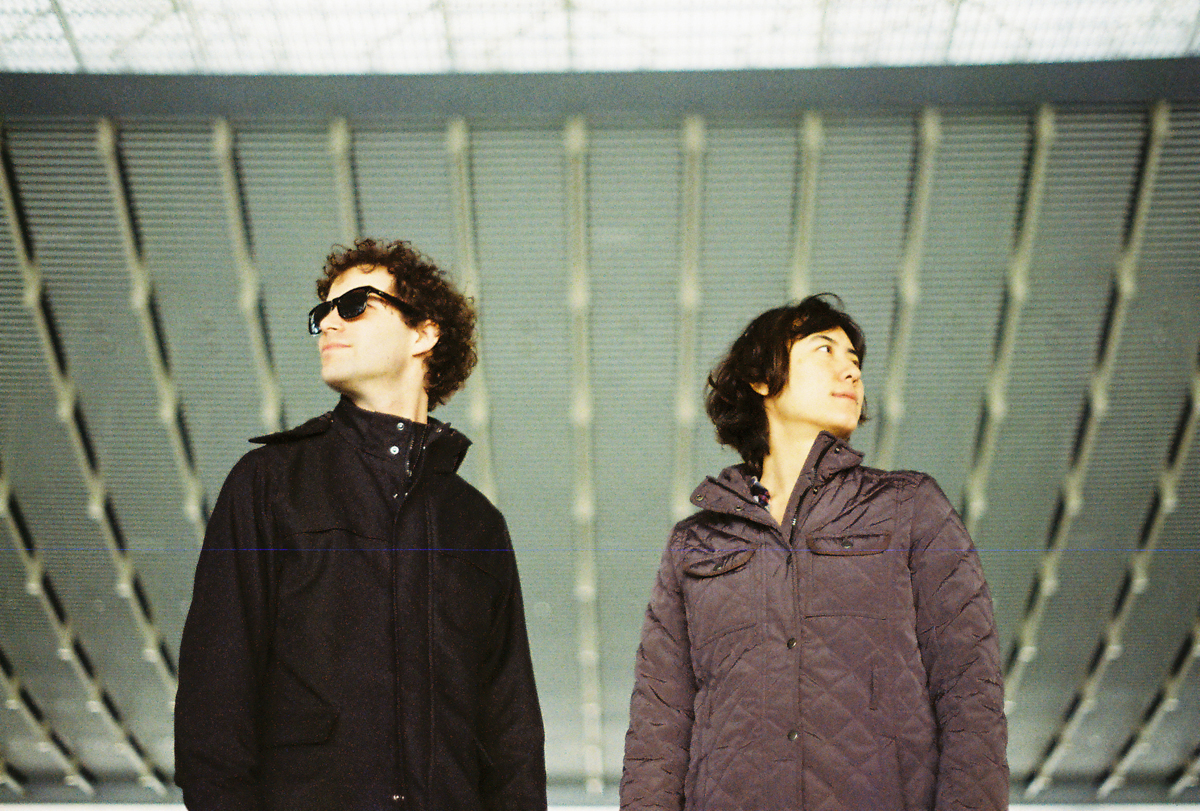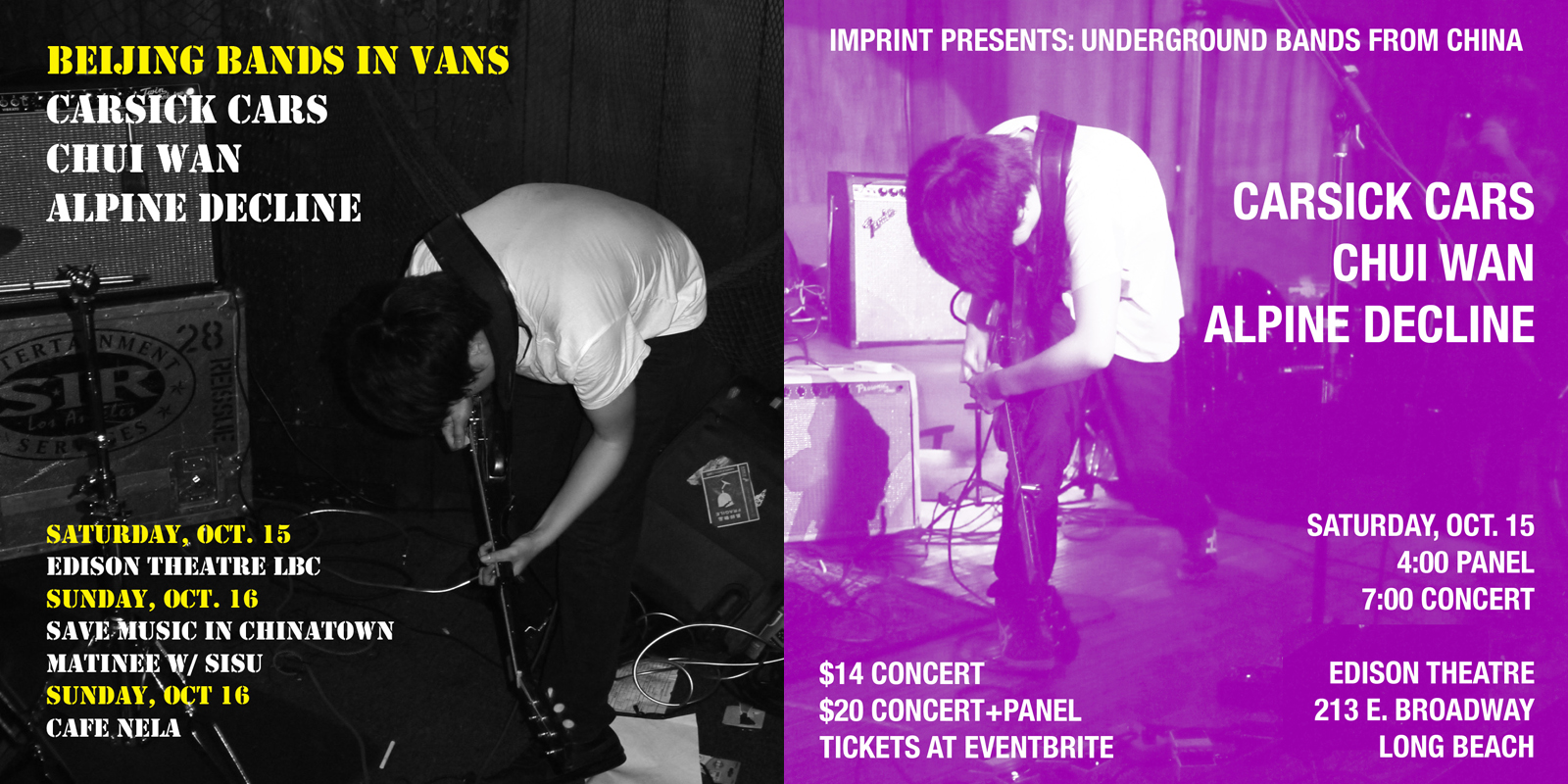Sep 20, 2016 Imprint Presents: Underground Bands from Beijing preview with Alpine Decline

I was stoked when Tanya and Julia gave me a green light to set up an Imprint event featuring underground bands from China. I had booked them to play a benefit for music education at my daughter’s school in Chinatown but how cool will it be for cool and noisy artists like Carsick Cars, Chui Wan, and Alpine Decline to play in Long Beach as well? And there will also be a talk about the underground music scene in Beijing as well. To get the word out, I’m putting up some posts. The first is an interview with Jonathan and Pauline Zeitlin a.k.a. Alpine Decline, the experimental shoe gaze duo that left Los Angeles for Beijing in 2010.
MW: Your amphibious life between L.A. and Beijing intrigues me. How long were you in L.A. for?
PZ: I grew up there.
JZ: I moved there after high school and joined a band with Pauline when I was twenty. We toured around and played in different bands together until around 2009 when we kinda blew things up, took a little break, and started Alpine Decline. We made three records one-after-another in 2010 and then hit it for China.
MW: Was it a tough decision to leave?
PZ: It doesn’t even feel like it was a decision.
JZ: The word “decision” gives us too much agency. Moving on has never been too hard for me, and we were both completely convinced, if we were truly committed to our vision for Alpine Decline, we had to drop off the face of the earth. It wasn’t even about China in that moment, when we moved we just knew we’d be on the outskirts of some completely unfamiliar megalopolis.
PZ: Yeah, it was totally the right thing to do but still really kind of an intense experience. The moment, y’know, like, landing and taking the car to our tiny room and having no one to guide you through.
MW: Do you feel bittersweet coming back? Triumphant?
JZ: I’ve felt a little dazed the last couple times coming back to America.
PZ: I think we’ve crossed some threshold where it feels weirder to be in America than China.
JZ: All this stuff is happening in China, but I don’t have the sense of people knowing about it here. I think it’s okay. I don’t know how many people resonate with the music coming out of China, especially if it’s in Chinese, but I think it’s okay, because it feels like everything just kind of seeps out there and, given time, like-minded people will pick up the scent.
PZ: What’s your sense of it? Are people getting turned on to music coming out of China? Do people know about Chui Wan and Yang Fan and Dear Eloise?
MW: I love Chui Wan, Dear Eloise, and P.K.14, but only learned about them because I used to help make a magazine and was always seeking out cool stuff to share. The mag is no longer, so now I’m trying to get the word out about these amazing bands through shows.
Has moving to Bejing affected your outlook toward music? art? life?
PZ: Well, now we have two outlooks. Because we had one perspective and then we moved, and over the years living in China, a second perspective slowly started to come into view.
JZ: A lot of the problems with music I’ve made in the past came from working on my intuition of what was good and what was awful in one particular context. Moving to Beijing gave me a totally different context, and showed me what was truly mine and what was just sticking on me from the environment. That’s not just music and art. That’s definitely also life.
MW: Can you describe the difference between being a cultural outlier in Beijing versus being one in a place like L.A.?
JZ: I didn’t really feel like a cultural outlier playing in a band in L.A. I guess that was part of the problem. The degenerate musician has been comfortably assimilated in western pop culture.
PZ: That’s definitely not the case in China.
JZ: No, not at all. And obviously much more so for Chinese artists than us, as foreigners. Whatever we do doesn’t really matter… which was kind of the appeal for us when we moved there.
MW: It always seems a lot of great music comes in gangs of bands, whether its ones that played CBGB,made up the Def Jam posse, or hung out at The Smell. Do you get that feeling in Beijing?
JZ: It’s a place we’d regularly have someone completely blow our minds and you’d look around and there’d be like, ten people—
PZ: All in bands.
JZ: The scene in Beijing was smaller before we came, and maybe in a way more potent or concentrated or something, but even now that it’s branched out and there are scenes coming around in other cities in China, it’s small enough that you feel like you are part of something special that still not a lot of people know about. It’s small enough that the bands are all catching influence from each other. It still feels kind of hidden in plain sight.
MW: Finally, the new record. Can you tell me about it and how it documents your growth as a band and humans? How are the songs to play live?
JZ: Life’s a Gasp is a long record with a lot of threads, but it’s mostly concerned with the costs of living without regrets. Pauline and I have both always lived pretty recklessly, full speed ahead. And as you go down the road, there are fewer off-ramps to different destinations, and pretty soon that’s it: it’s just your road and there’s no where else to go but forward.
PZ: So now we are on the road with no off-ramps.
JZ: When we were writing Life’s a Gasp, our lives felt full of thrills and adventure, full of meaning. But with these songs we were trying to take a look at the other side of the ledger and see the price we pay and why we have an impulse to live this way. Our own experiences might be a little esoteric, but I think there are some simple human emotions behind these things that anyone can connect with.
MW: What has it been like playing as a trio with Yang Haisong (from P.K. 14, Dear Eloise, After Argument…)? Any chance he’s coming to the U.S. with you?
PZ: We asked! But he can’t come to the U.S. on this tour, so it is back to our two-person show.
JZ: We just finished the tour in China… something like 30 shows in 34 or 35 days. He’s so busy, I think that was already him giving us too much time. [laughs]
JZ: Everything he does mirrors the values and the perspective he puts across in his own music, which is deeply inspiring for us… just as people.
PZ: He was great on tour, because you can see that everywhere in China he’s reached people through his music, but with us he was committed and focused like we were, and also sweet to our kid and great to travel with.
MW: Do you mind playing a matinee with kids in the audience?
PZ: No!
JZ: No, definitely not. I don’t mind playing music early at all but it’s more like —
PZ:I don’t think kids are going to like our music that much.
JZ: I think they will get into Chui Wan.
PZ: But you can try not to seem so scary.
JZ: Do I seem scary?
PZ: We read about the “Save Music in Chinatown” project when Chui Wan played L.A. last year. And we have a kid and we love L.A. and we love music, so we’re really happy to play and we hope Jonathan doesn’t scare the kids.
Looking up ticketing for Imprint Presents: Underground bands from China at eventbrite.com and follow Imprint on Twitter, Instagram, and Facebook, too.



